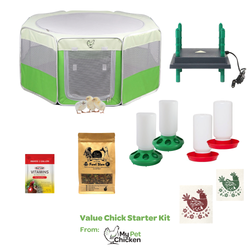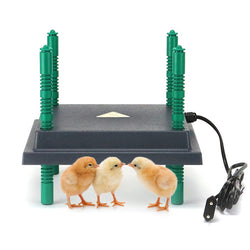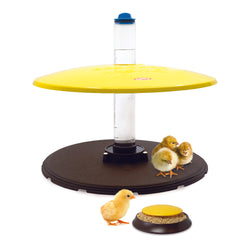How do I know if my chicken is sick?
Back to blog
We know you love your birds and want to make sure they're healthy. Just like our other animal friends, chickens can become ill. In this article we'll teach you what are the common signs and symptoms of illness, how to hone in on a diagnosis, and finally, help you decide when you'll need to call a veterinarian.

The bottom line is to use common sense when determining if your bird might be ill. While some symptoms can be indicative of normal, healthy responses like broodiness or molting, when you notice several of these symptoms together, your suspicions should be raised.

It can be helpful to have a small coop available for quarantining birds if necessary
If, on the other hand, your birds are exhibiting signs of serious illness, or if you are experiencing an unusual number of deaths in your flock that you can't explain, call your local veterinarian, your state's veterinarian, your state's animal/poultry diagnostic laboratory, your local cooperative extension office, or the USDA Veterinary Services offices (toll-free at 1-866-536-7593) for more information and advice.
You can consult the Association of Avian Veterinarians website to find the avian veterinarians nearest you, or you can try our friends at VetTriage. They're trained, licensed veterinarians who are on standby 24/7/365 and willing to provide tele-health services for your poultry for a very reasonable fee.
You can also watch these YouTube videos to see additional tips and advice:
Watch "Keep It Clean"
How to know if your chicken is sick
Chickens can be a bit sneaky, so knowing whether they need medical help can be tough. Here are a few important things to keep in mind.Chickens hide symptoms of illness.
Since they are prey animals, they want to hide weakness so they won't be picked off by predators. Other members of the flock can sometimes try to drive away sick birds, too, to protect themselves, so a sick bird will not necessarily be broadcasting its illness. Usually, sick chickens will stay inside the coop or in another hidden spot where you will not observe the changes in behavior that may clue you in. That said, most backyard chicken owners are pretty tuned in to their pets' personalities, and can tell when a bird may need attention.
Symptoms that your chicken might be sick
General symptoms of illness for chickens include:- lethargy
- inactivity
- standing or sitting with feathers ruffled
- droopy wings
- difficulty breathing
- sneezing
- a change in the color of the comb
- changes in droppings
Indicators that your chicken might not be sick
Birds may have watery poo when it's very hot outside, because they are drinking extra water to help keep themselves cool. Or they may seem lethargic and sit around with their feathers ruffled when they are broody and wanting to hatch eggs. Comb and wattle color can change based on mood and level of activity. Lethargy can be related to simply being sleepy of an afternoon after a nice treat; a pale comb can result from molting and a break in laying. Droopy wings and panting, may simply be the "I'm hot!" stance, when your bird holds her wings out from her body and breathes with an open beak to help cool down. Often, birds who are molting hide out from the rest of the flock, too.The bottom line is to use common sense when determining if your bird might be ill. While some symptoms can be indicative of normal, healthy responses like broodiness or molting, when you notice several of these symptoms together, your suspicions should be raised.
What to do with a sick chicken
When you think your bird needs a further evaluation, there are a few things you must do.First, quarantine your sick chicken(s)
Most chicken disease is catching, so you need to quarantine any sick birds away from the rest of the flock if you feel they are ill. Your sick birds birds need to be removed entirely from the flock and kept far away from the healthy members of the flock. You could set up an old dog crate in your garage, for instance, or many people have a small coop like this on hand for such instances of illness, separating breeding trios or brooding mamas, and so on.
It can be helpful to have a small coop available for quarantining birds if necessary
Second, examine her closely
Examine your sick bird(s) closely to help you narrow in on the possible cause of illness.- Check for wounds; they can sometimes be easy to miss under all those feathers.
- Look carefully for infestations of lice or mites--they especially like to congregate under the wings and around the vent.
- Be certain that leg scutes (scales) are smooth and clean (dirty, raised scutes can mean she is suffering from scaly leg mites)
- Does she feel heavy or is she losing weight?
- Evaluate the fullness of her crop. Is it full--is she eating? Or is it too full and unable to empty?
- Palpate to see if she has any hard mass in her abdomen that might indicate she is egg bound (unable to pass an egg)
- View her vent to see if it is in good condition
- Determine if she breathing easily, or if her tail or body is rocking up and down with the effort
- Make sure her eyes and nares (nostrils) are clear
- Last, examine her poo--do you see any worms? Is it normal in color and consistency?
Look closely for these signs of serious illness
You should be especially concerned about serious illness if you observed any of these behaviors in your chickens:- Coughing, wheezing, sneezing, or nasal discharge
- Swelling around the eyes, neck or head, or bubbles of goo in the eyes or nares (nostrils)
- Lethargy and lack of appetite paired with watery, green diarrhea
- Long lasting purple discoloration of the wattles, combs and legs
- Drooping wings paired with tremors, circling, twisting of head and neck or lack of movement
Finally, decide whether to call a veterinarian
Once you've made your examination, review what you have learned about your sick chicken's condition. Some issues are relatively easy to take care of at home, like mites lice or worms, and even most wounds. Read below in the "related questions" section to see how to deal with some of these common issues.If, on the other hand, your birds are exhibiting signs of serious illness, or if you are experiencing an unusual number of deaths in your flock that you can't explain, call your local veterinarian, your state's veterinarian, your state's animal/poultry diagnostic laboratory, your local cooperative extension office, or the USDA Veterinary Services offices (toll-free at 1-866-536-7593) for more information and advice.
You can consult the Association of Avian Veterinarians website to find the avian veterinarians nearest you, or you can try our friends at VetTriage. They're trained, licensed veterinarians who are on standby 24/7/365 and willing to provide tele-health services for your poultry for a very reasonable fee.
You can also watch these YouTube videos to see additional tips and advice:
Watch "Keep It Clean"



